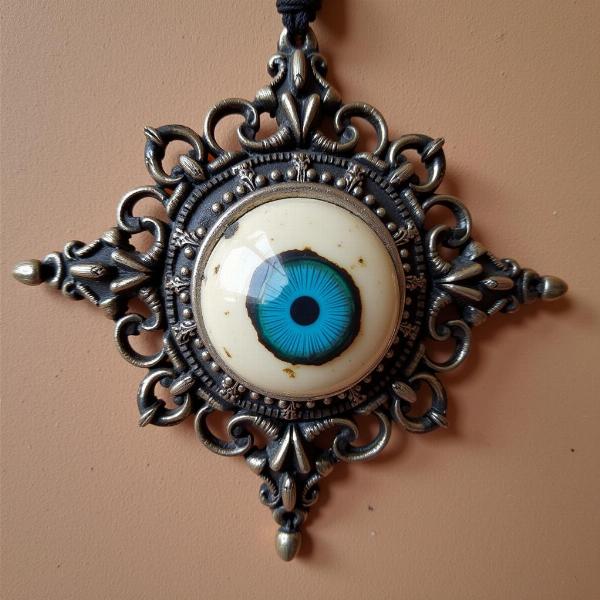Nazar battu, a common term in Hindi, refers to the belief in the evil eye and the methods used to ward it off. Understanding its meaning and significance in Indian culture provides valuable insights into the deep-rooted traditions and beliefs surrounding protection from negative energy. This article explores the nazar battu meaning in Hindi, its cultural context, and various protection methods.
What Does Nazar Battu Actually Mean?
Nazar battu literally translates to “evil eye warder” or “evil eye protector.” “Nazar” means sight or glance, while “battu” signifies something that repels or wards off. In essence, a nazar battu is an object or ritual believed to protect against the malevolent gaze of the evil eye. This malevolent gaze, often unintentional, is thought to bring bad luck, illness, or misfortune to the recipient.
 Example of Nazar Battu
Example of Nazar Battu
The Cultural Significance of Nazar Battu in India
The belief in the evil eye is prevalent across various cultures, and India is no exception. Deeply ingrained in Indian traditions, nazar battu is seen everywhere, from homes and businesses to vehicles and even children’s clothing. It reflects a cultural understanding of unseen energies and the desire to protect oneself and loved ones from harm. The use of nazar battu transcends religious boundaries, signifying its widespread acceptance and importance within Indian society.
Different Forms of Nazar Battu
Nazar battu takes various forms, each with its own unique significance and method of use. Common examples include:
-
Blue Eye Pendant/Charm: Perhaps the most recognizable form, the blue eye, often made of glass, is believed to deflect the negative energy of the evil eye.
-
Lemon and Chili: Hung together outside homes and businesses, the lemon and chili are believed to absorb negative energy.
-
Black Dot (Kaala Teeka): Often applied to children’s foreheads or behind their ears, the black dot is thought to ward off the evil eye.
How Does Nazar Battu Work?
The underlying principle behind nazar battu is the belief that the evil eye works by focusing negative energy towards its target. Nazar battu acts as a decoy, attracting the malevolent gaze and absorbing or deflecting its harmful effects, thereby protecting the intended recipient. This belief underscores the importance placed on safeguarding oneself from negative influences within the cultural context.
Regional Variations in Nazar Battu Practices
While the core belief remains the same, the specific practices and forms of nazar battu can vary across different regions of India. Certain regions might favor specific materials or rituals, highlighting the rich diversity within Indian culture and the adaptability of these protective practices.
Nazar Battu and Modern India
Even in modern India, the belief in nazar battu remains strong. While some might view it as superstition, many continue to use these charms and rituals as a form of cultural tradition and psychological comfort. This demonstrates the enduring power of cultural beliefs and their relevance in contemporary society.
Conclusion
Nazar battu, a deeply ingrained aspect of Indian culture, signifies the belief in the evil eye and the importance of protection from negative energies. From the blue eye pendant to the lemon and chili, various forms of nazar battu are employed to ward off misfortune and ensure well-being. Understanding the nazar battu meaning in Hindi provides valuable insights into the cultural fabric of India and its enduring traditions.
FAQ
-
What is the most common type of nazar battu? The blue eye pendant or charm is arguably the most recognizable form of nazar battu.
-
Why is nazar battu used on babies and children? Children are considered especially vulnerable to the evil eye, hence the common practice of applying a black dot or using other nazar battu for their protection.
-
Can I make my own nazar battu? While readily available for purchase, creating your own nazar battu can personalize its protective significance.
-
Is nazar battu only used in Hinduism? No, the belief in the evil eye and the use of nazar battu transcends religious boundaries in India.
-
Where can I buy nazar battu? Nazar battu can be easily found in local markets, shops selling religious or cultural items, and even online platforms.
-
Is there any scientific evidence supporting nazar battu? The efficacy of nazar battu lies primarily in cultural belief and psychological comfort rather than scientific evidence.
-
What is the significance of the color blue in nazar battu? Blue is often associated with protection and is believed to deflect negative energy.
Meaning-Hindi.in is your trusted partner for professional Hindi translation services. We specialize in various translation domains, including business and commercial documents, legal and certified translations, technical manuals, website localization, educational and academic materials, and express translation services. Our team of expert Hindi linguists ensures accurate and culturally sensitive translations to meet your specific needs. Contact us today at [email protected] or call us at +91 11-4502-7584 to discuss your translation requirements. Meaning-Hindi.in is dedicated to bridging language barriers and fostering effective communication.